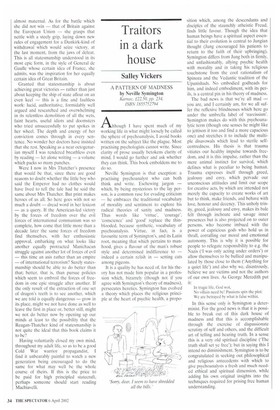Traitors in a dark house
Salley Vickers
A PATTERN OF MADNESS by Neville Symington Kamac, 122.50. pp. 234, ISBN 1855752794 Athough I have spent much of my working life in what might loosely be called the sphere of psychoanalysis, I avoid books written on the subject like the plague. Most practising psychologists cannot write. Since clarity of prose usually betokens clarity of mind, I would go further and ask whether they can think. This book emboldens me to do so.
Neville Symington is that exception: a practising psychoanalyst who can both think and write. Eschewing jargon — which, by being mysterious to the lay person, is a common ruse for evading criticism he embraces the traditional vocabulary of morality and sentiment to explore his radical theories of sanity and madness. Thus words like 'virtue', 'courage'. 'conscience' and 'good' replace the thinblooded, because synthetic, vocabulary of psychoanalysis. Virtue, in fact, is a favourite term of Symington's, and its Latin root, meaning that which pertains to manhood, gives a flavour of the man's robust style and determined indifference to — indeed a certain relish in — setting cats among pigeons.
It is a quality he has need of, for his theory has not made him popular in a profession which, bizarrely (though not if you agree with Symington's theory of madness), persecutes heretics. Symington has evolved a theory which places the religious principle at the heart of psychic health, a propo
sition which, among the descendants and disciples of the staunchly atheistic Freud, finds little favour. Though the idea that human beings have a spiritual aspect essential to their evolution is central to Jungian thought (Jung encouraged his patients to return to the faith of their upbringing), Symington differs from Jung both in firmly, and unfashionably, allying psychic health with morality and in taking his religious touchstone from the cool rationalism of Spinoza and the Vedantic tradition of the Upanishads. No embodied godheads for him, and indeed embodiment, with its perils, is a central pin in his theory of madness.
The bad news is that we're all mad — you are, and I certainly am, for we all suffer the reflexive blindnesses which here go under the umbrella label of 'narcissism'. Symington makes do with this psychoanalytic term (though one senses he might like to jettison it too and find a more capacious one) and stretches it to include the multiple disavowals which lead to sterile selfcentredness. His thesis is that trauma vitiates our healthy impulse towards freedom, and it is this impulse, rather than the mere animal instinct for survival, which defines what is peculiar to being human. Trauma expresses itself through greed, jealousy and envy, which pervade our unconscious attitudes and limit our scope for creative acts, by which are intended not merely the capacity to create works of art but to think, make friends, and behave with love, honour and decency. This unholy trinity, greed, jealousy and envy, makes its bale felt through inchoate and savage inner presences but is also projected on to outer persons, who become imbued with the power of capricious gods who hold us in thrall, corralling our moral and emotional autonomy. This is why it is possible for people to relegate responsibility to e.g. the Nazis CI was only acting under orders') or allow themselves to be bullied and manipulated by those close to them ('Anything for a quiet life') and also why we, disastrously, believe we are victims and not the authors of our own lives. As George Meredith put it:
In tragic life, God wot, No villain need be! Passions spin the plot: We are betrayed by what is false within.
In this sense only is Symington a determinist. For the good news is that it is possible to break out of this dark house of madness and that this is accomplishable through the exercise of dispassionate scrutiny of self and others, and the difficult art of telling and hearing truth. In a sense this is a very old spiritual discipline (The truth shall set ye free'); but in saying this I intend no diminishment. Symington is to be congratulated in seeking out philosophical and religious antecedents with which to give psychoanalysis a fresh and much needed ethical and spiritual dimension, while adding his own original insights into the techniques required for prising free human understanding.






























































 Previous page
Previous page